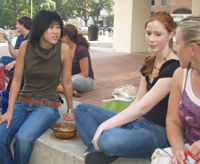Student cuts teeth on international
research
by Mary Helen
YarboroughPublic Relations
When looking for a summer research project, Alice Hoang decided to go to Bangkok, Thailand, and study how the spread of avian influenza is best observed.
What Hoang took from the experience could be described as life’s lessons all rolled up in one compact series of events spanning only a couple of months.
 Alice Hoang, from
left, takes a break with fellow dental students Lyn Reeve and Lindsay
Grosso.
Alice Hoang, from
left, takes a break with fellow dental students Lyn Reeve and Lindsay
Grosso.Hoang was among 15 dental students who participated in the MUSC Summer Health Professionals Research program supported by an institutional research training grant (T32) from the National Institute of Dental and Craniofacial Research (NIDCR) and the College of Dental Medicine.
Hoang, a second-year dental student, is the first CDM pre-doctoral student to participate in overseas research, said Susan Reed, DDS, DrPH, Hoang’s advisor in the College of Dental Medicine. “NIDCR has supported training for pre-doctoral students for many years. The future trend is for NIDCR to strengthen the post-doctoral training grant program and lessen the support for the predoctoral students. We are fortunate that Dean Sanders and the College of Dental Medicine have continued to be a strong support for student research,” Reed explained.
Preparing for and getting to Thailand was a bit of a challenge, and getting settled into a foreign place added another level of discomfort.
Within one week, she had to get a ticket to Bangkok, find an apartment, get her vaccinations and pack a suit- case with enough clothes to last six weeks. Then she could organize her research, explained the Charleston native of Vietnamese decent.
Getting there was made possible through Reed and her Thai colleague who had studied together for their doctorates in oral epidemiology at the University of Michigan, Ann Arbor. Reed contacted her friend, Dr. Yaowaluk Bovonsanjitid at Mahaidol University in Bangkok, who helped accommodate Hoang’s needs.
Though the experience was challenging and stressful at times, Hoang said she learned a lot about life abroad and about herself. The experience and what she saw there inspired her to pursue health disparities research.
“This was a personal learning experience,” said Hoang, who majored in neuroscience and behavioral biology and women’s studies at Emory University. “Seeing how health disparities play out in countries like Thailand … is more poignant, I believe, and put everything in perspective.”
Forging new territories seldom is much fun, unless people get excited about frustration and fear.
“My research kept changing due to the lack of communication with my contacts in Asia and the inherently slow process of establishing a relationship with them,” she said. “It was very hectic. There were language barriers, I had to get used to a totally different culture. I didn’t have a lot of research experience anyway, so, it wasn’t very fun in the typical sense, but it was fun and a great experience. I learned a lot.”
Hoang will present her research: “Evaluation of the Surveillance System for Influenza in Thailand: Implications for Prevention and Warning Systems Policy,” during a poster demonstration Nov. 2 during the Perry V. Halushka Student Research Day.
“While there was really nothing particularly novel about my research project, the answers to the research question of whether passive or active surveillance is more effective in tracking avian flu will impact their public health policy,” Hoang said. “Essentially, passive surveillance isn't as effective as active surveillance. This finding will be important in implementing vaccination and warning systems policy on this issue. No one has researched that subject in that particular area of Thailand, but it has been done in other places.”
Learning and enjoying
Hoang said that her research project provided great opportunities to meet influential people in international policy. She learned how to collect epidemiologic data during her stay in Nakhon Phanom, a small town nestled among mountains in northeast Thailand; separated from Laos by the Mekong River. The surveillance center is a collaboration between the Thai Ministry of Public Health and the Centers for Disease Control and Prevention, which helped her gather and evaluate data for her research paper.
“While the main purpose for my summer in Thailand focused on research, I managed to sneak in a few extra-curricular activities—picture taking, shopping and eating,” Hoang said. “Thailand provided me with epic lessons in gastronomy—epicurean delights for fractions of dollars.”
Because it’s virtually impossible for her to find authentic Thai food in America, she has given up eating it here. Meanwhile, “The shopping was amazing since Bangkok is the fashion capital of Asia; the clothes there cost mere fractions of what we pay in the United States,” she said. “The architecture of the ‘wats’ or Buddhist temples is beautiful, as are the beaches. Every angle is a picture postcard.”
Hoang also managed a side trip to Cambodia to donate some medical supplies.
“If dental students are interested in international research at all, I strongly encourage them to pursue it. I was lucky enough to have a great, committed mentor in Dr. Reed. .... In the end, researching in Thailand gave me the chance to learn about international health policy, the procedure of research, the adaptation to cultural differences and the hurdle of language barriers. I managed to learn a little bit of Thai, a decent amount of research methodology, and a lot about life.”
Friday, Oct. 26, 2007
Catalyst Online is published weekly,
updated
as needed and improved from time to time by the MUSC Office of Public
Relations
for the faculty, employees and students of the Medical University of
South
Carolina. Catalyst Online editor, Kim Draughn, can be reached at
792-4107
or by email, catalyst@musc.edu. Editorial copy can be submitted to
Catalyst
Online and to The Catalyst in print by fax, 792-6723, or by email to
catalyst@musc.edu. To place an ad in The Catalyst hardcopy, call Island
Publications at 849-1778, ext. 201.